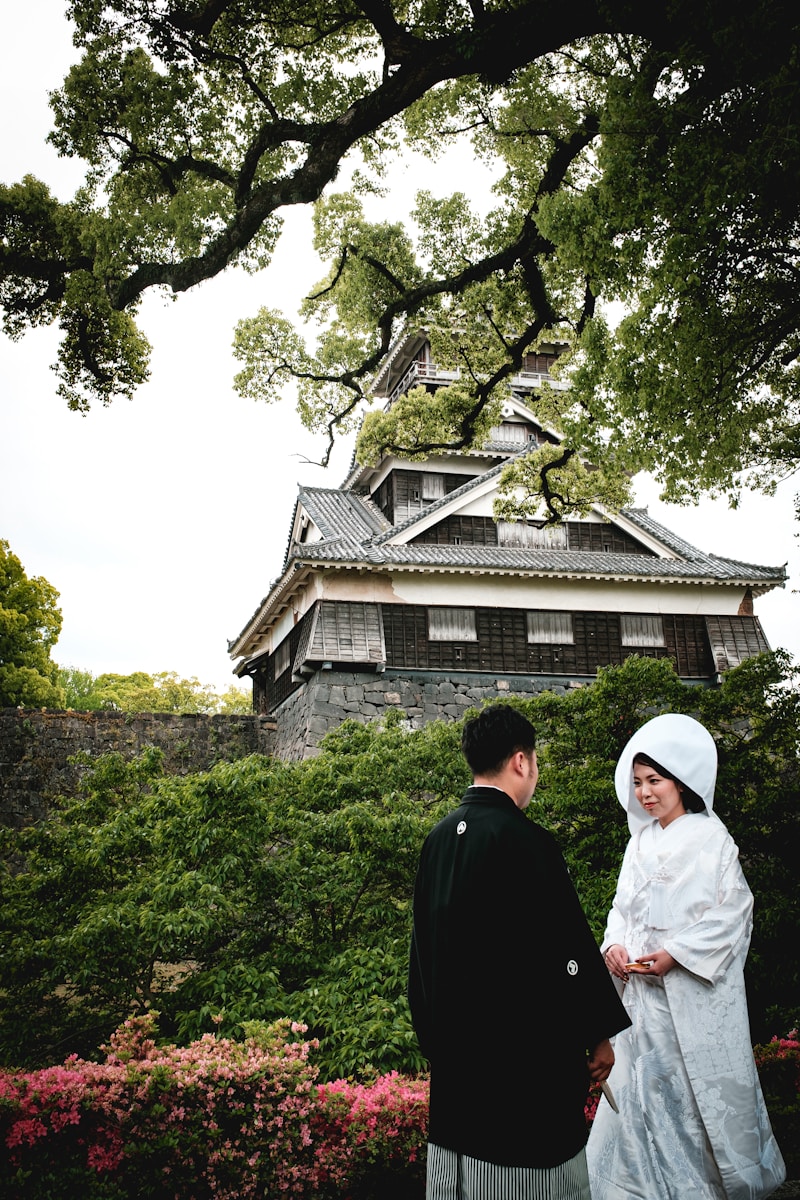In the heart of Japan, where the past and present elegantly intertwine, traditional weddings stand as a testament to the nation’s rich cultural tapestry. These ceremonies, steeped in centuries-old customs, offer a mesmerizing glimpse into the soul of Japan, celebrating love and union in ways that are uniquely their own. From the intricate rituals to the exquisite attire, Japanese traditional weddings are a profound expression of devotion and respect, not just between the couple but also towards their families and ancestors. This article takes you on a journey through the enchanting world of Japanese nuptials, unveiling the customs, traditions, and heartfelt moments that define these remarkable celebrations.
Unveiling Nuptials: A Peek into Japan’s Traditions
Japanese weddings are a blend of solemn tradition and joyful celebration, meticulously planned and executed. These ceremonies, deeply rooted in Shinto or Buddhist practices, symbolize more than just the union of two hearts; they represent the unification of two families and honor the ancestors. At the core of these traditions is the belief in kami (spirits or gods), which are invited to witness and bless the matrimonial union. The rituals performed, from purification rites to offerings, are designed to ensure the couple’s future happiness and prosperity.
The Invitation: A Prelude to Matrimony
The journey to a Japanese wedding begins with the invitation, a carefully crafted piece that reflects the solemnity and elegance of the occasion. Traditionally, these invites are handwritten in calligraphy on specially selected paper, signaling the importance of the event. The inclusion of symbolic elements, like the koi fish for luck and longevity or cherry blossoms for transient beauty, adds a layer of meaning. These invitations are not just a call to celebrate but an honor, conveying respect and appreciation for the guests.
The Dress Code: Kimonos and Beyond
At a traditional Japanese wedding, the attire is a vivid tapestry of the country’s cultural heritage. The bride may wear a shiromuku, a pure white kimono symbolizing purity and willingness to color her future with her spouse’s hues, or a colorful uchikake as a sign of good fortune. The groom complements with a montsuki haori hakama, a formal kimono featuring his family crest. This dress code, rich in symbolism, adds to the visual splendor of the ceremony, creating a timeless link to the past.
Sacred Venues: Where Traditions Thrive
The choice of venue for a traditional Japanese wedding is often a shrine or temple, places permeated with spiritual significance. These sacred spaces, surrounded by serene gardens and ancient architecture, provide a tranquil backdrop for the solemn vows. The presence of kami is strongest here, making it an ideal setting for the couple to seek blessings. The natural beauty of these locations also reflects the Shinto belief in the sacredness of nature, adding an ethereal quality to the nuptials.
Sake Sharing: A Symbol of Union
One of the ceremony’s highlights is the sharing of sake, known as san-san-kudo. This ritual involves the couple taking three sips each from three different-sized cups, symbolizing the sealing of their bond and the integration of their families. The numbers are significant—three is an indivisible number, and repeating the action three times ensures the act’s permanence. This shared cup becomes a vessel of promise, a tangible representation of their intertwined destinies.
The Exchange of San-san-kudo
Expanding on the sake-sharing ritual, san-san-kudo is a profound emblem of commitment, extending beyond the couple to include both families. After the bride and groom partake, their parents also share the sake, strengthening the ties between the two families. This ritual, steeped in respect and unity, beautifully illustrates the communal nature of marriage in Japanese culture, where two families become one through the bonds of love and shared experiences.
Rituals and Readings: The Heart of the Ceremony
Every aspect of a traditional Japanese wedding is imbued with meaning, from the rituals performed to the words spoken. Priests or shrine maidens may recite prayers and blessings, invoking the kami’s favor and protection. The couple may also exchange vows, a relatively modern addition, personalized to reflect their hopes and promises to each other. These readings, whether ancient or contemporary, resonate with the spiritual essence of the occasion, weaving a sacred narrative of the couple’s journey together.
Music and Dance: Celebrating Love and Life
Music and dance play a pivotal role in traditional Japanese weddings, encapsulating the joy and vitality of the celebration. Classical instruments like the koto or shamisen may serenade the guests, creating an atmosphere of refined elegance. In some ceremonies, professional dancers perform ancient rites, embodying gods or spirits to bless the union. This fusion of art and spirituality elevates the ceremony, infusing it with beauty and grace that transcends the mundane.
Feast of Joy: Traditional Wedding Cuisine
The wedding feast is a lavish affair, showcasing the best of Japanese gastronomy. Each dish is selected for its symbolism and seasonal appropriateness, creating a menu rich in meaning. From auspicious seafood to delicately prepared vegetables, the cuisine reflects wishes for a prosperous and healthy life. The artful presentation is a feast for the eyes, embodying the meticulous attention to detail that characterizes Japanese culture.
Gifts and Favors: Sharing the Good Fortune
Gift-giving is an integral part of Japanese weddings, encapsulating gratitude and goodwill. Guests often present Goshugi, a monetary gift in a special envelope, contributing to the couple’s future. In return, the newlyweds offer wedding favors, carefully chosen to convey thanks and good luck. These exchanges, governed by etiquette and heartfelt sentiment, reinforce the communal spirit of the occasion, weaving a tapestry of mutual respect and affection.
Post-Wedding Practices: Continuing the Celebration
The celebration doesn’t end with the ceremony. Post-wedding practices, such as visiting a shrine in full wedding attire or hosting a more informal reception, allow the couple to share their joy with a wider circle. These events, relaxed yet respectful, offer an opportunity to celebrate the newlyweds’ future, bridging traditional solemnity with modern conviviality.
Beyond the Ceremony: The Evolution of Japanese Weddings
While traditional Japanese weddings are a beautiful homage to the past, contemporary practices are increasingly woven into the fabric of these ceremonies. Couples may opt for a fusion of western and Japanese elements, embracing the white wedding dress alongside the kimono. Yet, even as customs evolve, the essence of Japanese weddings remains unchanged—a celebration of love, family, and tradition, deeply rooted in the country’s cultural heritage.
Japanese traditional weddings are a beautiful, intricate dance of customs, symbolism, and deep-rooted cultural values. They stand as a vibrant testament to Japan’s rich heritage, effortlessly blending the solemnity of ancient rituals with the joy of a modern celebration of love. As we’ve journeyed through the elements that make these nuptials so special, from the sanctity of the sake-sharing ritual to the communal joy of the post-wedding practices, it’s clear that these ceremonies are more than just a union of two hearts. They are a profound celebration of life, love, and cultural identity, cherished not just on the day of the wedding but woven into the fabric of Japanese society itself.








